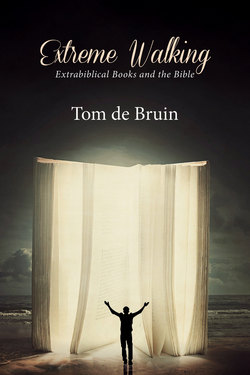Читать книгу Extreme Walking - Tom de Bruin - Страница 7
На сайте Литреса книга снята с продажи.
B. Extrabiblical Books
ОглавлениеChristians are very focused on the Bible. There is nothing wrong with that. When Christians speak of the Bible, however, confusion can arise. Somewhere in history we agreed on a canon, meaning we agreed on the actual contents of the Bible. When most Protestants refer to “the Bible,” they mean a certain sixty-six books in the Old and New Testaments. These books together are often called Scripture or the Word of God. Christians consider these books to be inspired.
Almost all Christians know that there are more books from the time of the Bible. In some Bibles you might see nine books printed between the Old and New Testament. These are called the deuterocanonical (second canon) or apocryphal (hidden) books. The sixty-six–book canon is not the only one: the Catholic canon has more books, seven or nine, depending how you count. We will discuss these books in more detail later.
What most Christians don’t know is that the deuterocanonical books are just the tip of the iceberg. Some Ethiopian churches have fifteen additional books in their canon, but even that doesn’t include all the books out there. There are hundreds of Jewish and Christian books from the time of the Bible. Very few people actually know what is in all these books. In fact, most Christians are likely to ignore them, because they don’t consider them to be part of inspired Scripture.
Uninspired
Inspiration is a complicated topic. Let’s think about it for a moment: is the daily devotional we read inspired? What about latest book by a famous Christian author? Or that textbook on economics? Is the newspaper inspired? What about the news on TV? None of these are inspired like the Bible is, but we don’t just ignore them. They contain valuable information that we need to have. When we ignore ancient Jewish and Christian sources, we miss out on a treasure trove of useful information. I find that very strange. Most of us would agree that archaeology and history are vital to understanding the Bible. As good students of the Bible, we should not ignore these extrabiblical books either. They can help us to understand the Bible so much better.
There are two ways that these books can strengthen our faith and inform our theology. The first has to do with the large amount of time between the Old and New Testaments. If all the Old Testament books were written by the people they are ascribed to, we are talking about a span of at least five hundred years. Even if we assume the books were written by their followers, there are still centuries between the two testaments.
Consider the last three centuries of world history. Think of the great literature that has been written, the changes in culture and philosophy, the various religions that have gained and lost ground. Consider the countries that have been founded or have disappeared. Imagine trying to ignore all of that. What would you misunderstand because you lack the correct information? Let me put that the other way around: if you were to time travel from 1717 to 2017 would you understand anything correctly? If we ignore these writings, which are often the only witness to ancient culture that we still have, we miss out on huge amounts of information. Sometimes, we understand the New Testament poorly because of this.
Consider the differences between the Old and the New Testament. Satan is hardly in the Old Testament (just three times), and is present almost everywhere in the New Testament. Where does that emphasis on Satan come from? The Old Testament is silent about an afterlife: the dead know nothing, feel nothing, experience nothing. The New Testament shows a different picture. There is an eternal fire (Mark 9:45–28) and Jesus makes a trip to the underworld (1 Peter 3:19). Where does this belief in a hell and underworld come from?
Discontinuity
In Biblical Studies, we call this logical leap discontinuity. That means that certain topics don’t match up. We see discontinuity between the Old and the New Testament in some areas. Naturally, this discontinuity did not just appear out of nowhere. It is the result of hundreds of years of thinking, believing, and writing. Sometimes this led people away from God’s ideals—Jesus regularly renounces various doctrines. Other times it did not.
We are going to look at these extrabiblical books, but not to form a theology. We want to read them to understand the context—the background—of the inspired authors of the Bible, and to understand what they are reacting against. We will study them to better understand the worldviews present in the books.
First Test, Then Decide
That brings us to the second way these books can strengthen our faith and theology. Our interpretation of the Bible is very dependent on those who came before us. We know a lot about some earlier interpreters and very little about others. Who knows: by studying more theological ideas of early Christians, we might find something that helps us understand God’s revelation even better. If we decide not to even look at these books, we have automatically decided that there is nothing useful in them, without even having explored the possibility.
Paul famously says “test everything; hold fast to what is good” (1 Thessalonians 5:21). This is a task for each of us. We can’t just make assumptions; we can’t just take other people’s opinions for granted. Theology is a process of searching and researching, questioning and testing. In this book, we will take Paul’s advice. We will discover what is outside of the Bible, and test it.
Trust me, we will see wonderful things.
